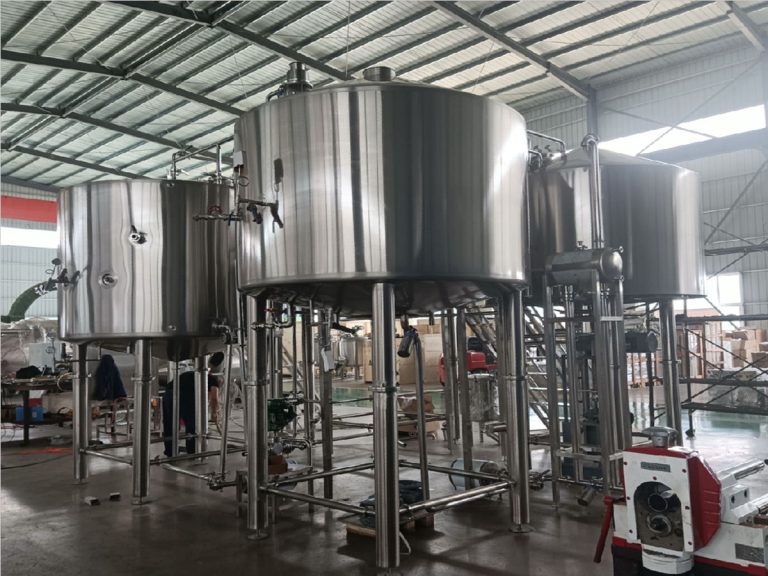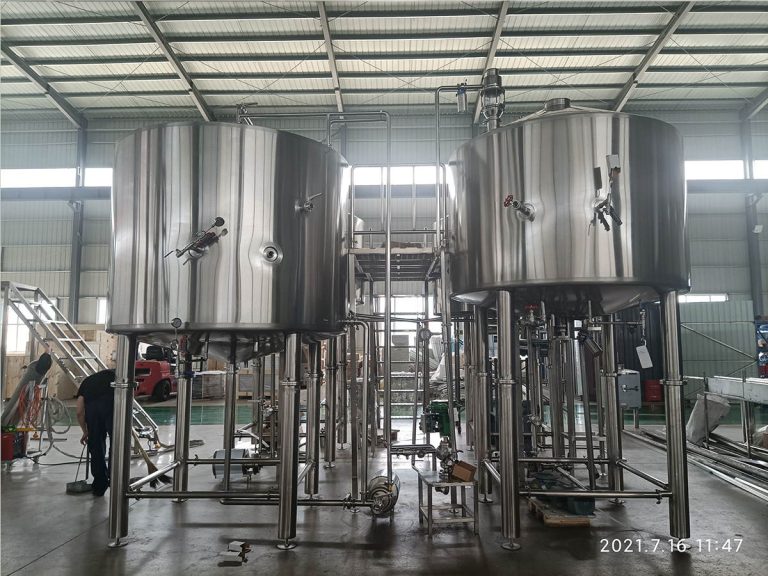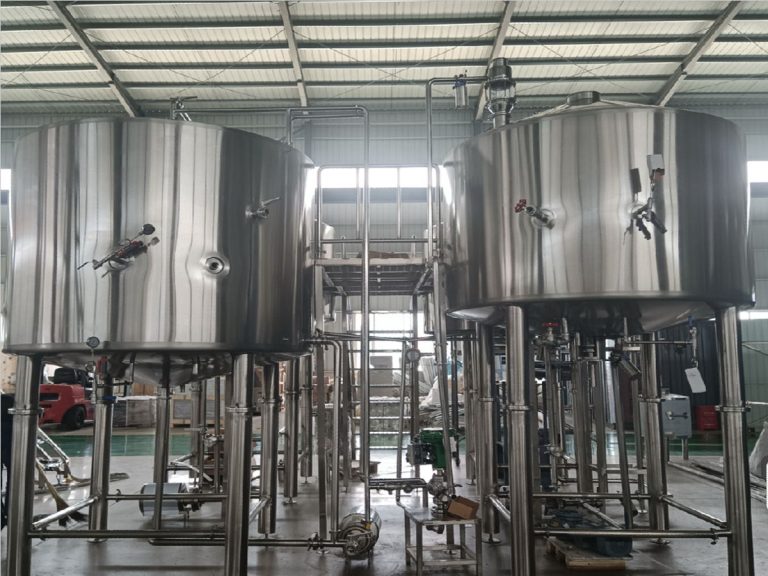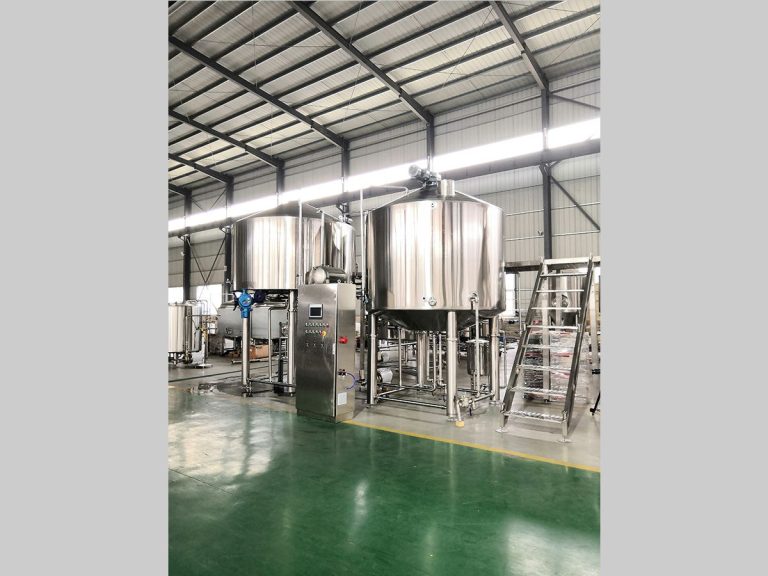



A 3000L microbrewery setup typically includes various components needed for brewing beer on a smaller scale. This equipment allows brewers to produce craft beer in larger quantities than homebrewing.We offer a turnkey brewing system service. The service includes: complete set of microbrewery equipment, installation turn key, recipes and technology of branded beers, staff training and more.








A 3000L microbrewery setup typically includes various components needed for brewing beer on a smaller scale. This equipment allows brewers to produce craft beer in larger quantities than homebrewing.We offer a turnkey brewing system service. The service includes: complete set of microbrewery equipment, installation turn key, recipes and technology of branded beers, staff training and more.
A 3000L microbrewery setup typically includes various components needed for brewing beer on a smaller scale. This equipment allows brewers to produce craft beer in larger quantities than homebrewing.We offer a turnkey brewing system service. The service includes: complete set of microbrewery equipment, installation turn key, recipes and technology of branded beers, staff training and more.
3000L Three Vessel Brewhouse System
1.Introduction:
A 3000L microbrewery setup typically includes various components needed for brewing beer on a smaller scale. This equipment allows brewers to produce craft beer in larger quantities than homebrewing.We offer a turnkey brewing system service. The service includes: complete set of microbrewery equipment, installation turn key, recipes and technology of branded beers, staff training and more.
2.3000L micro brewing system specification:
| Output/Brew | 3000L |
| Brew/Week | 6~12 |
| Output/Week | 180HL~360HL |
| Electric Supply | 3phase/380(208, 415,480,575…)v/50 (60)Hz |
| Heating Source | Steam/Direct Fired Heating |
| Area Request | >150m2 |
| Brewmaster | 3 |
3.3000L Microbrewery Equipment Configuration:
1)Malt Milling Unit
Particle adjustable rolling crusher
Flexible or steel auger to directly lift the milled grain to mash tun
2) 3000L 2 or 3 or 4Vessels Brewhouse Unit
Mash tun, Lauter tun, Boiling Kettle, Whirlpool tun in various combination
6000L hot water tank and 6000L cold water tank for optional in special combinations
Infusion or decoction brewing methods are designed exactly
Stainless steel 304 are popular because of easy maintenance and clean
Two stages or single stage heat exchanger for wort cooling
Completely stainless-steel integrated work platform
Sanitary and efficiency wort pump
All piping and fittings
3) 3000L or 6000L Fermentation Unit
Standard stainless steel conical cylindrical fermentation tanks
Single size or double size as brewhouse is common used in microbreweries
Tanks quantity is exactly calculated by fermentation cycle for various beers
All manhole, valves, pressure gauges, spunding vavle, fittings etc are included
4) 3000L or 6000L Bright Beer Tank Unit
Standard stainless steel bright tanks for beer maturation, conditioning, service, carbonation
Single size or double size as fermenter is common used in restaurant or bar
Tanks quantity is exactly calculated for various beers and the function
All manhole, valves, carbonation stone, pressure gauges, spunding valve, fittings etc are included.
5)Beer Filter Unit(optional)
Craft beer is no need filtration which will keg filling for quickly consumption
Plate-Frame or Candle type DE (diatomite earth) filter or Ceramic membrane filter is used for clarify the beer
6) Glycol Cooling Unit
Insulated glycol water tank with or without copper coil for glycol liquid holding and mixing
Efficiency chillers or refrigerators with freon to supply cooling energy
Sanitary centrifugal pump for glycol water recycle among tanks and heat exchanger
All pipes, fitting, insulation materials are included
7)Controlling Unit
Electrical controlling cabinet with temperature, on-off controlling for brewhouse
Electrical controlling cabinet with temperature, on-off controlling for cooling parts
Temperature controller, thermocouple, solenoid valves etc are included
PLC with touch screen panel for special request
8)Beer Dispense
Keg filling and washing machine
Semiauto bottling machine with rinsing, filling, capping, labeling etc
Flash pasteurizer or tunnel pasteurizer is available
9)Other Facilities
Portable or fixed CIP system for cleaning the tanks
Steam boiler for brewhouse heating
Water treatment for brew water
Oil free air compressor
4.Advantages of 3000L microbrewery equipment:
A 3000L microbrewery setup offers several advantages:
Moderate Scale Efficiency: It strikes a balance between small craft brewing and larger industrial operations. This allows for increased production without losing the craft quality.
Consistency: Larger batch sizes often lead to more consistent results. This is vital for maintaining the quality and taste profile of the beer, crucial for brand loyalty.
Operational Efficiency: Larger equipment can streamline processes, potentially reducing labor costs and time spent on individual batches.
Expansion Capability: It provides room for growth. Breweries can gradually increase production without having to completely overhaul their equipment.
Wider Market Reach: Increased production capacity enables breweries to meet higher demands, potentially expanding distribution and reaching new markets.
Flexibility and Creativity: While larger, a 3000L setup still allows for experimentation and creative brewing techniques, maintaining the craft brewing ethos.
Cost-Effectiveness: Though larger than smaller microbrewery setups, a 3000L system might be more cost-effective in terms of production per liter compared to even larger industrial brewery systems.
Customization Options: Manufacturers often offer customization for equipment within this range, allowing brewers to tailor their setup to their specific needs and brewing styles.
5.What factors should be considerations about 3000L microbrewery equipment:
Several key factors should be considered when planning a 3000L microbrewery equipment setup:
Space Requirements: Ensure you have enough space for the entire brewery setup, including brewing vessels, fermentation tanks, storage, and potential expansion room.
Budget: Determine your budget for equipment, installation, utilities, and ongoing operational costs. Consider both initial investment and long-term expenses.
Quality vs. Quantity Balance: Balancing increased production capacity with maintaining the quality and consistency of your beer is crucial. Ensure the equipment meets quality standards and allows for precise control over brewing parameters.
Utility Needs: Consider water, electricity, and gas requirements for the equipment. Ensure your location can support these needs without major infrastructure changes.
Customization Options: Look for equipment that can be tailored to your specific brewing needs and preferences. Consider factors like material quality, automation level, and additional features.
Technical Expertise: Assess the level of expertise needed to operate and maintain the equipment. Training and knowledge about brewing processes, equipment handling, and maintenance are essential.
Regulatory Compliance: Understand and comply with local regulations and health codes regarding brewery operations, sanitation, waste disposal, and product labeling.
Supplier Reputation and Support: Choose reputable suppliers known for quality equipment and good customer support. Consider warranty, maintenance, and technical assistance provided by the supplier.
Scalability: Consider the potential for future expansion. Ensure the equipment allows for scalability without significant disruption to operations.
Workflow and Efficiency: Plan the layout of the brewery to optimize workflow and efficiency. Ensure ease of movement between different stages of the brewing process.
Environmental Impact: Consider sustainability and environmental impact. Look for equipment that offers energy efficiency and waste reduction options.
Market Analysis: Conduct market research to understand the demand for your beer and how the equipment will help meet market needs without overproducing or underdelivering.
Conclusion:
A 3000L microbrewery setup typically includes various pieces of equipment necessary for brewing beer on a commercial scale. The specific equipment you’ll need can vary based on your brewing process, preferences, and the types of beer you plan to produce. Additionally, considerations like the space available, local regulations, and budget will also influence your choices. When setting up a microbrewery, it’s often helpful to consult with equipment suppliers or experienced brewers to ensure you’re getting what’s best suited for your needs.

Tong Brewing Is One Top Professional Designer And Supplier Of High-Quality Complete Craft Beer Brewing Equipment From China.